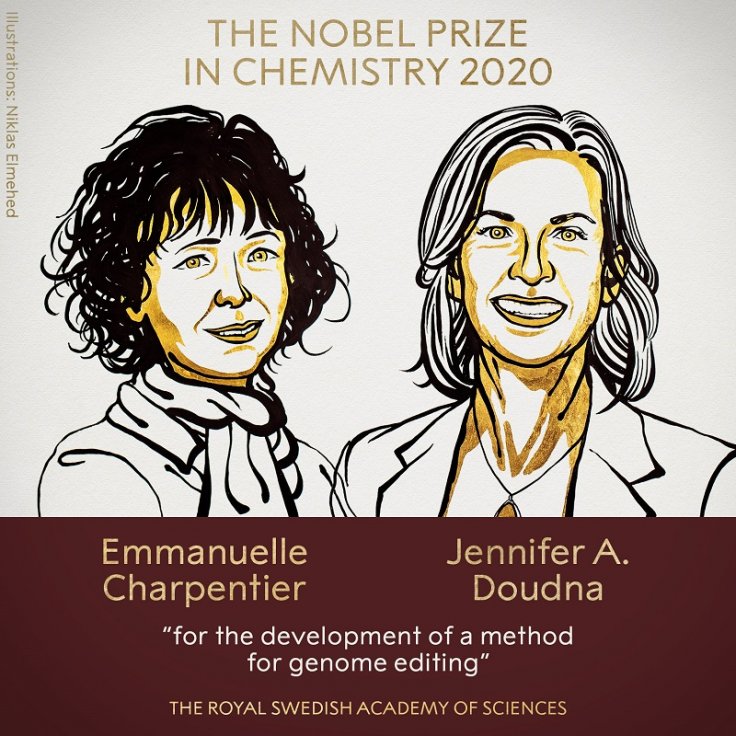Two scientists, Emmanuelle Charpentier and Jennifer Doudna have been awarded the 2020 Nobel Prize in Chemistry for developing revolutionary CRISPR/Cas9 genetic scissors'—tool for genome editing.
The technology is a way of making precise and specific changes to the DNA. The revolutionary tool discovery helped the researchers change the DNA of animals, plants as well as microorganisms and brought massive changes in life science. The tool is now being used in new cancer therapies and researchers believe that it will also one day help to cure inherited diseases.
The winners, American biochemist Jennifer Doudna and French professor and researcher Emmanuelle Charpentier, will share the prize money of 10 million krona ($1,110,400).

A Revolutionary Discovery
The Nobel Committee selected two women scientists, Doudna, at the University of California in Berkeley, and Charpentier, now at the Max Planck Unit for the Science of Pathogens in Berlin, for their revolutionary genome-editing technology which has swept through labs worldwide and has countless applications.
After the announcement by the Nobel Committee on Wednesday, October 7, Doudna said, "I grew up in a small town in Hawaii and I never in a hundred million years would have imagined this happening. I know so many wonderful scientists who will never receive this, for reasons that have nothing to do with the fact that they are wonderful scientists." Charpentier told BBC that she became emotional after learning about the award. She said, "When it happens, you're very surprised, and you think it's not real. But obviously, it's real."
Both the scientists are only the fifth and sixth women to win the Nobel Prize in chemistry. Claes Gustafsson, chair of the Nobel Committee for Chemistry, said that "there is enormous power in this genetic tool" that will lead the world towards the groundbreaking the new medical treatment.
Including the winners of the 2020 Nobel Prize in Chemistry, several other scientists have been recognized in other high-profile awards as key contributors in the development of CRISPR that include Feng Zhang at the Broad Institute of MIT and Harvard in Cambridge, Massachusetts, George Church at MIT and biochemist Virginijus Siksnys at Vilnius University in Lithuania.
Misusing Technology!
While Doudna and Charpentier developed the CRISPR for general use, some of the system's applications have caused ethical debates around the genetic modification of human embryos. It was in 2018, when a Chinse scientist, He Jiankui revealed that he had used the DNA editing tool to make changes in the genes of two babies to make them resistant to HIV.
But many scientific communities raised voice against the process, calling it dangerous and irresponsible as the scientists were concerned about the side effects of the procedure and Jiankui's lack of transparency. No Nobel, no awards, no acknowledgment--the daring work of the Chinese doctors, who was an Associate Professor at the Southern University of Science and Technology, put him behind the bars for three years.
Nobel Prize in Chemistry
However, the Nobel Prize in the past has frequently honored work which led to practical applications in wide use today. Here are previous winners of the Nobel Prize in Chemistry in the past five years:
2019: M Stanley Whittingham, John B Goodenough, and Akira Yoshino were awarded for their work on lithium-ion batteries.
2018: Frances Arnold, George P Smith and Gregory Winter won the Nobel Prize for the discoveries about enzymes
2017: Joachim Frank, Jacques Dubochet, and Richard Henderson received the award for improving images of biological molecules
2016: Jean-Pierre Sauvage, Bernard Feringa, and Fraser Stoddart shared the Nobel Prize for the making machines on a molecular scale.
2015: Tomas Lindahl and Paul Modrich and Aziz Sancar won the award for their discoveries in DNA repair









